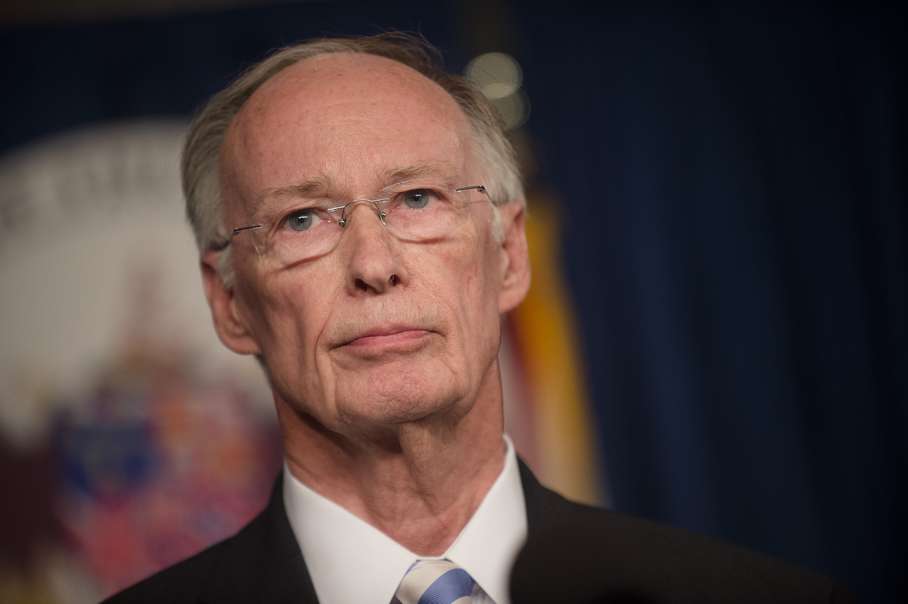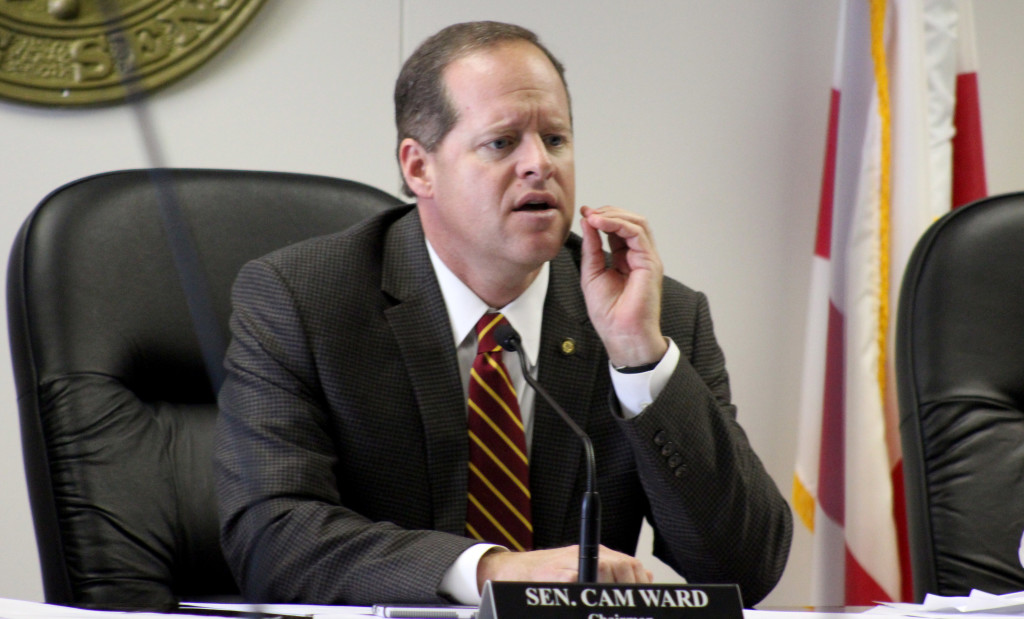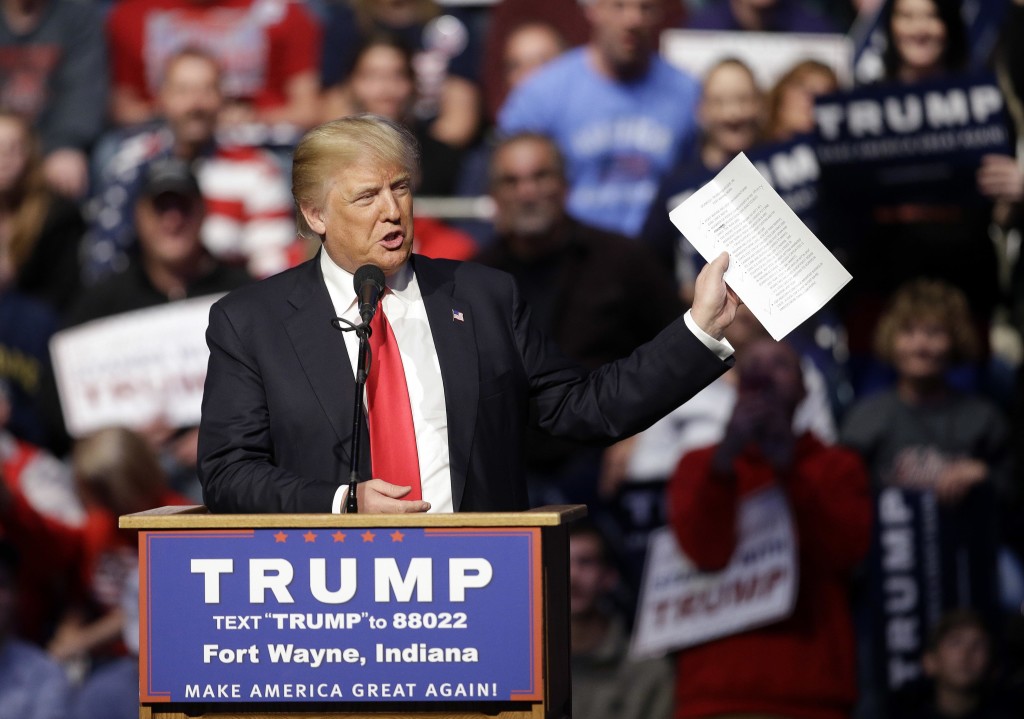Donald Trump far behind in preparing for general election

The Republican presidential nomination may be in his sights, yet Donald Trump has so far ignored vital preparations needed for a quick and effective transition to the general election. The New York businessman has collected little information about tens of millions of voters he needs to turn out in the fall. He’s sent few people to battleground states compared with likely Democratic rival Hillary Clinton, accumulated little if any research on her, and taken no steps to build a network capable of raising the roughly $1 billion needed to run a modern-day general election campaign. “He may be able to get by on bluster and personality during the primaries, but the general election is a whole different ballgame,” said Ryan Williams, a veteran of Mitt Romney‘s presidential campaigns. “They’re essentially starting from zero heading into the general election.” Trump’s early campaign efforts – fueled in the primary season by the sheer force of his personality and free media coverage – have defied all who predicted they would fall short of what’s required to win the nomination. Yet the billionaire’s aides acknowledged they’ll tap into the resources of the party’s establishment – the Republican National Committee, above all – as the scale and scope of the 2016 contest grow exponentially. That’s even as he rails daily against his party’s establishment as corrupt, and they predict his unique success so far will pay off again in November. “Our ability to run a different type of campaign against Hillary Clinton in a general election is unique to the success that Mr. Trump has shown in the primaries,” said Corey Lewandowski, Trump’s campaign manager. Trump’s late start marks a sharp break from past Republican campaigns and that of Clinton, who is already beginning to shift resources to the November election. The Republican front-runner’s organizational disadvantage marks another warning sign for GOP officials who already feared he was unelectable this fall – even if he were well-prepared. Trump has taken steps in recent week to add experienced political staff to expand his bare-bones organization. Yet the team has been consumed by playing catch up with Republican rival Ted Cruz, devoting almost no energy or planning to the next phase. Trump hopes he can score a victory in the Indiana primary Tuesday that can effectively end Cruz’s bid. Lewandowski and other aides have also signaled a willingness to work closely with the Republican National Committee should Trump claim the nomination – “hand in glove,” in Lewandowski’s words. Ed Brookover is working from a recently opened Washington-area office that is tasked with developing Trump’s detailed policy prescriptions and working with allies on Capitol Hill. “From all reports – we’ve not gone in and kicked the tires yet – the RNC’s got a larger ground game already in place than ever before,” Brookover said. “And they’ve been investing an incredible amount of money on data.” He said that’s “going to be incredibly helpful.” Indeed, the Republican National Committee has been expanding its national footprint and accumulating detailed information about millions of general election voters since soon after the GOP’s disastrous 2012 election. With only a few employees on the ground at this time four years ago, the RNC now has more than 200 in general election battlegrounds such as Florida, Ohio, North Carolina, Virginia and Colorado. “We are so far ahead of where we were,” said RNC chief strategist Sean Spicer. “Whether it’s Trump or someone else, that’s going to be a huge advantage.” On the Democratic side, Clinton has already begun to send waves of campaign staffers to battleground states. Adviser are starting to consider locations for a splashy convention rally in Philadelphia and lawyers are scrutinizing more than two dozen possible vice presidential picks. The Democratic front-runner also has a well-established donor network and is planning lucrative fundraisers in New York, Michigan, California and Texas later this month. Trump has lashed out at other candidates for raising money from wealthy donors, but GOP leaders anticipate he will need to do the same thing in the coming months. Many Republicans are skeptical that Trump has the willingness or the capacity to cover the estimated $1 billion cost of the campaign ahead. Absent a massive personal investment, Trump and his party will be tasked with raising millions of dollars a day to match spending levels from the past election. The Romney campaign spent years developing an extensive fundraising network and collected general election cash long before his primary contest was decided. For now, though, the Trump campaign concedes it has done little to prepare for the fall fight. “Once we are the nominee, we will look at all the options,” Lewandowski said of fundraising. Trump still has staff on board in battlegrounds such as Ohio and Florida, though employees and volunteers have been consumed by the primaries. “We’re focused on winning Indiana and then going on and winning California and New Jersey and anything in between,” said Stephen Stepanek, Trump’s co-chairman in New Hampshire, which is a perennial swing state. “Then we will start talking about the general election.” Republished with permission of the Associated Press.
High court rejects appeal over long hair in Alabama prisons

The Supreme Court won’t hear an appeal from Native American inmates who want to wear their hair long in Alabama prisons. The justices on Monday let stand an appeals court ruling that said the state’s prison system could keep in place its policy requiring male inmates to cut hair short. Inmates argued that keeping their hair long is part of core Native American religious traditions. But prison officials said long hair was a hygiene risk and could be used to conceal weapons and contraband. The 11th U.S Circuit Court of Appeals acknowledged that many other prison systems allow inmates to follow the grooming practices of their religion. But the appeals court ruled that Alabama’s system could make its own assessment on the benefits and risks. Republished with permission of the Associated Press.
Robert Bentley a no-show for the State Auditor’s summons

Before sixty seconds had come to pass, Alabama State Auditor Jim Zeigler deemed Governor Robert Bentley a no-show Monday morning saying he failed to answer his summons to respond to questions about his alleged misuse of state resources. Zeigler made his summons public on April 21 when he announced he’d be waiting Monday morning in his office “at 10 a.m. with a court reporter, and a Bible to swear in the Governor.” Announcing before the crowd gathered in his office, “So at this time I will call for the witness, Governor Robert J. Bentley. Is there a representative for Governor Robert J. Bentley? We will reach the conclusion that the witness has not appeared in violation, therefore of the order to appear issued April 21,” Zeigler said. The summons, possible due to a little-known portion of state code allowing the state auditor to require testimony under oath, called for Bentley to produce documents regarding alleged mismanagement of state resources surrounding Bentley’s relationship with his former chief aide, Rebekah Mason. Bentley’s no-show was not altogether unexpected. In the initial response to the summons, Bentley had said, “The appropriate legal process is through the Alabama Ethics Commission where the Auditor has already filed a complaint, and we are fully cooperating in every way. I do not intend to respond further to Mr. Zeigler.” Zeigler now plans to file a court order in the Montgomery County Circuit Court by May 9 to compel Bentley’s testimony.
Terri Sewell introduces bipartisan bill to save rural hospitals

Alabama Democratic Congresswoman Terri Sewell joined Republican Rep. Cresent Hardy of Nevada Friday in introducing H.R. 5133: the Rural Hospital Enhancement and Long-Term Health (HEALTH) Act of 2016. The Rural HEALTH Acts a bipartisan effort aimed at supporting existing rural hospitals through State Offices of Rural Health (SORH) and incentivize construction of new facilities for communities in need. It also requires the federal Department of Health and Human Services to report annually on the state of America’s rural health systems, something that hasn’t been done since 2003. This report must examine the number of hospital closures and their causes. “The growing fragility of rural hospitals, combined with inaccessibility issues and grave health disparities, threatens the economic viability of the most underserved communities in our country,” said Sewell. “The Alabama State Office of Rural Health (ASORH) provides critical State and Federal resources to develop long-term solutions for residents of our most rural and vulnerable communities.” Sewell continued, “ASORH’s recent collaboration with the Veterans Affairs to provide mental health care to rural Veterans through telehealth is just one example of how our state organization is an outstanding steward of the federal funding provided through the State Offices of Rural Health Program. As more rural hospitals are being forced to shut their doors, and rural health services are being cut, it is my hope Congress will respond by making the revitalization of America’s rural health care infrastructure a top priority and pass the Rural HEALTH Act.” For Sewell’s co-sponsor Rep. Hardy, the bills hits especially close to home as the only hospital in Tonopah, NV, in his District, closed August leaving area residents hours away from emergency medical facilities. “More than 30 percent of America’s rural hospitals are vulnerable to conditions that have caused the closure of 71 facilities since 2010,” said Hardy. “We have to act now to prevent more families from losing their literal lifelines in times of emergency. The Rural HEALTH Act will help us save rural America’s hospitals.” The bill has the support of the Alabama Department of Public Health, the Alabama Rural Health Association, and the National Organization of State Offices of Rural Health (NOSORH), and the American Osteopathic Association. Sewell’s press announcement included statements of their support. “This legislation is extremely important as it will enable the continuation of the vital services provided by the Alabama State Office of Rural Health (ASORH),” said Dr. Thomas M. Miller, Alabama State Health Officer. “Overall, the services provided by the ASORH have had a very positive impact on the health care and quality of life of Alabama’s 1.6 million rural residents.” In a letter of support, Dale E. Quinney, Executive Director of the Alabama Rural Health Association said, “The Alabama Rural Health Association strongly supports this legislation that, among other things, will increase sorely needed funding for our State Offices of Rural Health … Past experiences of the State Office of Rural Health Program provide ample evidence that this will be a wise investment that will produce benefits far exceeding the investment.” Teryl Eisinger, Executive Director National Organization of State Offices of Rural Health (NOSORH) said, “Rural health care systems throughout the country continue to operate in a fragile state. By reauthorizing the State Office of Rural Health grant program, this bipartisan legislation will help provide improved access to quality health care for the 61 million Americans living in rural areas. NOSORH now calls on the leadership of both parties in the House of Representatives to pass this measure at the earliest opportunity.” Dr. John W. Becher, President of the American Osteopathic Association also weighed in. “Rural hospitals are a critical part of the health care infrastructure, and the closure of these facilities can have a significant negative impact on rural patients’ access to care, as well as a physician’s ability to practice effectively within their community. Your legislation seeks to both protect and strengthen rural hospitals by expanding grant opportunities available to them. These grants will help foster both public and private investment in rural hospitals to promote greater stability for these facilities, and will also support efforts to recruit and retain health care professionals to serve in rural areas. This bill also recognizes the need for proper congressional oversight by ensuring that both Congress and the states are informed by the most recent overview of the state of our nation’s rural health care system.”
State bureaucrats killed anti-earmarking bill, says sponsor Cam Ward

When Sen. Cam Ward proposed an anti-earmarking bill, it made sense to the many fiscal hawks in conservative-dominated Montgomery. Alabama sets aside 91 percent of its General Fund revenue for predetermined purposes, the highest percentage in the nation and some four times the average. That can make it difficult to weather fiscal storms, leading to indiscriminate across-the-board cuts to state services — already less well-funded than even many of the state’s Deep South neighbors — when times are lean, and puts no pressure on state agencies to justify their spending, since they know last year’s appropriations are the automatic baseline for this year’s. So Ward introduced SB15, which would have “un-earmarked” some 15 percent of the state’s spoken-for funding, amounting to around $450 in the 2016 budget and presumably rising over time. Ward says such a move giving lawmakers more flexibility to set priorities and adjust to fluctuations in revenue, which can vary widely. The bill also contained provisions intended to keep intact state dollars which draw down federal funding, creating a multiplier effect in revenue which most consider sacred. It also softened the potential blow to services by leaving unchanged funding for critical services. But the bill died early on in the 2016 Legislative Session. The culprit, according to Ward? Those state agencies who draw down federal dollars and provide critical services, among others. Veterans groups publicly opposed the bill, after which supporters somewhat scaled back their plans to overhaul the way the statehouse budgets. But behind the scenes, Ward told Alabama Today, a cavalcade of other state government interests also blocked the way for Ward’s reform. Pushback from veterans was doubtless an obstacle, but advocates for less-than-critical spending also pushed to get their way, including interests on behalf of state parks, historical preservation, and the Department of Human Resources. Agencies that provide mental health services and rural fire departments also balked at the changes. Ward says business groups were on board with his effort. “They actually liked it,” said Ward. “It’s a great issue, but it’s tough to enact.” Ward, who chairs the Senate Judiciary Committee, says he’ll continue to push to unmoor spending from arbitrary markers and revamp a budgeting process that allows lawmakers discretion over less than 10 percent of overall funding. “It’s just a dysfunctional way to run a budget. It leaves you no way to deal with a crisis when it comes up,” said Ward.
Hillary Clinton tops Donald Trump in new Florida poll

Hillary Clinton would defeat Donald Trump in Florida, but Floridians don’t have a favorable impression of either candidate. A new survey by business group Associated Industries of Florida found that Clinton would defeat Trump in Florida, 49 percent to 36 percent. The former Secretary of State leads the New York Republican in almost every demographic, including Hispanics (+43) and voters in the critical I-4 corridor (+19). The only demographic where Trump leads Clinton is among whites (+8). While Clinton might be the favored candidate, she isn’t well liked. The survey found 52 percent of Floridians said they had an unfavorable opinion of her. Forty-six percent of respondents said they had a favorable opinion while 3 percent said they were unsure. Clinton was upside down in several major demographics, including Hispanics (-2), non-major party voters (-8) and millennials (-31). And yet, her unfavorables are nothing compared to those of Trump. The survey found 62 percent of Floridians had an unfavorable opinion of Trump while 33 percent had a favorable view. Four percent of respondents said they were unsure. The survey found 87 percent of Hispanics, who will make up about 14 percent of the general electorate, have an unfavorable opinion of Trump. He’s also underwater among females (-32) and non-major party voters (-34). AIF also looked at how Ted Cruz would fare in Florida. The survey found 58 percent of Floridians said they had an unfavorable view of the Texas Republican; while 28 percent said they had a favorable view. Cruz was underwater in almost every demographic, including non-major party voters (-25), females (-30) and whites (-27). Clinton would also defeat Cruz in the Sunshine State. Forty-eight percent of Floridians said they would choose Clinton while 39 percent stated that they would pick Cruz. The Associated Industries of Florida survey interviewed 604 likely general election voters by phone from April 25 through April 27.
Donald Trump has a ‘plan B’ for convention – outside help

Donald Trump has a Plan B if he’s faced with a contested convention, and it involves the sort of outside groups that he’s called “corrupt.” While the billionaire businessman might lock up the Republican presidential nomination in the next five weeks of voting, he and his allies are simultaneously undertaking a parallel effort in case he falls short. Outside groups, including one led by longtime Trump political ally Roger Stone, and a loose collection of colorful supporters such as “Bikers for Trump” are organizing ahead of the July convention in Cleveland. They’re soliciting money to pay for their transportation and housing, and they’re already trying to influence the mood of the convention with a social media campaign saying that anything short of a Trump nomination would be “stealing.” “Our principal focus right now is Cleveland,” Stone said of his group, called Stop the Steal. “We want to bring as large a contingent as possible to demonstrate the breadth of Trump’s appeal so that the party can see graphically what they’re going to lose if they hijack the nomination from him.” Stop the Steal and other groups are gaining steam even though Trump has insisted he wants no donor help for his bid and is beholden to no one. Super political action committees “are a disaster, by the way, folks,” Trump said at a Republican debate in March. “Very corrupt.” Stop the Steal is not technically a super PAC, but it operates under very similar rules. This past week, Trump’s lawyers sent the Federal Election Commission a letter renewing the campaign’s disavowal of groups using his “name, image, likeness, or slogans in connection with soliciting contributions.” All the groups planning Cleveland activities repeatedly use his name in their literature. Trump set the stage for what the outside groups are doing by making provocative comments about the complex way Republicans pick a nominee — “rigged,” he calls it. Voters weigh in, but each state has its own rules about what delegates go to the convention and how they must vote on a presidential candidate while they’re there. Stop the Steal and other Trump fans are pushing a similar message on social media and websites. “The big steal is in full swing,” one online letter says, calling unfriendly delegates “stooges.” The Stone-led Cleveland coalition includes We Will Walk, Bikers for Trump, Citizens for Trump and Women for Trump. Stone said the goal is to bring thousands of people to march peacefully in the streets. “We are prepared to bring the Republican Party down if they mess with Trump and try to take it away from him by doing the dirty tricks,” said Paul Nagy, a New Hampshire Republican. He runs We Will Walk, a group that has collected more than 41,000 online signatures of people who say Trump deserves the nomination. The public relations offensive is a counterpart to GOP rival Ted Cruz‘s carefully crafted, labor-intensive strategy of recruiting friendly delegates in hopes he can win if Trump falls short on the first ballot of voting. This weekend in Arizona, Cruz won another strategic victory over Trump, getting numerous friendly delegates elected to head to Cleveland while the Trump backers appeared to be virtually shut out. Those delegates are required to first vote for Trump at the convention because he won the state, but they could later switch their votes to Cruz. While Cruz is playing within the party’s rules, Trump’s claim that what Cruz is doing amounts to “stealing” resonates with voters. In mid-April, after Cruz swept Colorado’s elected delegates, stay-at-home mom Erin Behrens said she felt sick about what was happening to her candidate. So Stop the Steal helped her organize protests in the state. Stone and an ally, Greg Lewis, flew in to help Behrens answer email and arrange a rally. At the April 15 event in Denver, about 200 demonstrators waved banners that read “Banana Republicans” and chanted “Stop the Steal!” Behrens said in an interview last week that she’s continuing to organize Trump supporters in Colorado. “If there’s funny business and they make it clear they’re going to not give it to Trump, Stop the Steal Cleveland will be one thing,” she said. “But we will have protests, events across the United States. Count on it.” A good chunk of what the outside groups are doing now is fundraising. “Bottom line we need to raise $262,000 in the next two weeks,” Stop the Steal’s website says. “If you can’t make it to Cleveland will you help those who can? Will you send $500, $200 or even $100 to this crucial effort?” A different pro-Trump group, Great America PAC, also is raising money for a Cleveland effort. This one is led by William Doddridge, chief executive officer of the Jewelry Exchange. Its commercials warn that “party elites” will try to seize the nomination from Trump at the convention and suggest that people stop that from happening by calling an 800 number and giving money. It needs the help. The group’s latest fundraising report, covering through the end of March, shows it is more than $600,000 in debt. The super PAC can take unlimited contributions from individuals, corporations and unions. Trump’s lawyers have specifically asked it to cease operations. Stop the Steal isn’t a super PAC, the category of outside group that attracts the most ire from Trump, Stone said. But it’s a distinction without a difference. It is organized as a political nonprofit “527” group that files periodic disclosure reports about its donors and spending with the Internal Revenue Service rather than the Federal Election Commission. Like an FEC-monitored super PAC, a 527 can take unlimited amounts of money from individuals, corporations and unions. Republished with permission of the Associated Press.
In Indiana, Ted Cruz faces make-or-break moment to stop Donald Trump

Facing a make-or-break moment for his slumping campaign, Texas Sen. Ted Cruz was blitzing through Indiana on Monday in a desperate bid to overtake Donald Trump in the state’s primary and keep his own White House hopes alive. A victory for Trump in Indiana on Tuesday would be a dispiriting blow for Cruz and other forces trying to stop the front-runner, leaving them with few opportunities to block his path. Trump is the only candidate in the race who can reach the 1,237 delegates needed for the GOP nomination through regular voting, though Cruz is trying to push the race toward a contested convention. “This whole long, wild ride of an election has all culminated with the entire country with its eyes fixed on the state of Indiana,” Cruz said Sunday at a late night rally. “The people of this great state, I believe the country is depending on you to pull us back from the brink.” Several hundred people came to see him Monday at Bravo Cafe in Osceola, where he predicted a close finish in the primary and said: “We need every single vote.” “You’re the perfect man for the job,” a man told him as diners consumed coffee and eggs. “God bless you,” Cruz said, gripping his hand. Cruz was holding five events across Indiana on Monday. Trump was holding a pair of rallies in the state, though he was already confidently looking past Cruz and setting his sights on Democratic front-runner Hillary Clinton. Trump made clear Monday that he would keep up his accusation that Clinton is playing gender politics: “We’re making a list of the many, many times where it’s all about her being a woman.” “I haven’t started on Hillary yet,” he told CNN, although actually he’s been trashing her record for quite some time. For her part, Clinton told thousands at an NAACP dinner in Detroit on Sunday that President Barack Obama‘s legacy can’t be allowed to “fall into Donald Trump’s hands” and be consumed by “these voices of hatred.” She cited Trump’s “insidious” part in the birther movement that questioned Obama’s citizenship. Clinton’s campaign announced Monday that she had raised $26 million in April. Vermont Sen. Bernie Sanders has vowed to stay in the Democratic race, though he acknowledged Sunday that he faces an “uphill climb.” His only path rests on a long-shot strategy of winning over superdelegates, the elected officials, lobbyists and other party insiders who are free to back either candidate. Trump can’t win enough delegates Tuesday to clinch the Republican nomination. But after his wins in five states last week, Trump no longer needs to win a majority of the remaining delegates in coming races to lock up the GOP nomination. The importance of Indiana for Cruz became evident even before he and fellow underdog John Kasich formed an alliance of sorts, with the Ohio governor agreeing to pull his advertising money from Indiana in exchange for Cruz doing the same in Oregon and New Mexico. But that strategy, which appeared to unravel even as it was announced, can’t help either man with the tens of thousands of Indiana voters who had already cast ballots: Early voting began in Indiana three weeks before they hatched their plan. It also risks alienating those who have yet to vote, said veteran Indiana Republican pollster Christine Matthews. She said she believes many have continued to vote for Kasich in Indianapolis and in the wealthy suburbs north of the city. “Indiana voters don’t like the idea of a political pact, or being told how to vote,” Matthews said. Trump went after Cruz on Sunday, suggesting evangelical conservatives have “fallen out of love with him” and mocked his decision to announce former GOP presidential candidate Carly Fiorina as his running mate. “They’re like hanging by their fingertips,” he said, mimicking Cruz and Kasich: “Don’t let me fall! Don’t let me fall!” Trump let on that he’s eager to move on to a likely general election race against Clinton. He said the end game of the primary battle with Cruz is “wasting time” that he could be spending raising money for Republicans running for the Senate. “It would be nice to have the Republican Party come together,” Trump told supporters in Fort Wayne. “With that being said, I think I’ll win anyway.” Republished with permission of the Associated Press.
Daily fantasy sports websites comply with Alabama Attorney General’s order to leave

Daily Fantasy Sports (DFS) websites DraftKings and FanDuel have reached an agreement with Alabama Attorney General Luther Strange to cease operations in the state after the AG’s office declared the relatively new practice to constitute illegal gambling last month. In DFS, participants pay to create a roster of players, then pit their roster against those of other participants. Whomever’s roster performs the best that day within a particular pool wins prize money through the site. “I am pleased to report that fantasy sports operators DraftKings and FanDuel have complied with my order that they halt paid contests within the State of Alabama,” said Strange. “As Attorney General, it is my duty to uphold Alabama law, including the laws against illegal gambling. The daily fantasy sports operations violate state law because a player stakes something of value on a contest of chance in order to win a prize. While there is a measure of skill involved in creating a fantasy sports roster, in the end, contestants have no control over the performance of the players on their rosters. This activity is illegal under Alabama law.” In addition to ceasing operations in the state, DraftKings and FanDuel must process user requests from Alabama-based IP addresses to withdraw their account balances within seven business days of receiving such requests, according to the AG’s office. According to Alabama Code Section 13A-20-12, a person participates in gambling if he or she “stakes or risks something of value upon the outcome of a contest of chance or a future contingent event not under his control or influence, upon an agreement or understanding that he or someone else will receive something of value in the event of a certain outcome.” Gambling in Alabama is illegal, with a few exceptions including buying securities and commodities, insurance, and some grandfathered activities. DFS sites often contend they are games of skill, not of chance, and thus aren’t covered under most states’ gambling laws, but Strange argues this is not sufficient to keep them legal in Alabama. Two bills which would have undone the AG’s actions are stalled indefinitely in their houses of origin in the Alabama Legislature. With only two days left in the 2016 Regular Session, it is now virtually impossible for either of them to be considered during this session.
Bradley Byrne: Defense bill blocks attempt to cut Mobile shipyard

Southwest Alabama has a proud military tradition. Our area is home to a large number of veterans. The Coast Guard has a strong presence here. Important military vessels are constructed up and down the Gulf Coast. These are all things we take great pride in. That’s why it was so frustrating last December when Secretary of Defense Ash Carter announced his plans to cut the Littoral Combat Ship (LCS) program from 52 total ships to just 40. The LCS is the Navy vessel built at Austal USA in Mobile. Over 4,000 men and women are directly employed by the shipyard. Two different versions of the LCS are currently built by Austal in Mobile and Marinette Marine in Wisconsin. The Secretary also proposed eliminating one of the versions entirely in a “downselect” to a single builder. Navy officials testified before Congress that this would result in one of the shipyards closing entirely. I immediately went to work to make sure his efforts would not be successful. When the President’s budget was released and included the proposed cuts, I doubled down in my efforts. Ultimately, it is the decision of Congress, not a lame-duck President and a lame-duck Secretary of Defense. Let me be clear up front: I don’t support the LCS program simply because it is built in our area. I support the program because the Navy has made clear time and time again they like the LCS, and they need the ship in order to fulfill their mission. If these ships weren’t critical to the Navy, then I wouldn’t have a leg to stand on. So, I set out to stop these proposed cuts. In Congress, I serve on the House Armed Services Committee, which has jurisdiction over our nation’s entire military. Each year, the Committee must pass legislation known as the National Defense Authorization Act (NDAA). This is the bill that sets policy and authorizes funding for military operations and programs. As part of his efforts to cut the program, President Obama’s budget only requested funding for two Littoral Combat Ships this year, instead of the required three ships. My goal was [to] make sure the NDAA included full funding for three ships while also stopping the cuts from moving forward. I’m pleased to report that our efforts were successful, and the NDAA includes funding for three ships. I also introduced an amendment to prevent the Pentagon from following through with their plans to eliminate one of the two builders. My amendment was adopted without any opposition. Ultimately, the NDAA passed the full Armed Services Committee early Thursday morning after more than fifteen hours of debate. In a sign of the truly bipartisan nature of our committee, the bill passed by a vote of 60 to 2. This was a resounding victory for all the men and women who work at the Austal shipyard in Mobile. This means both Republicans and Democrats agree that President Obama is wrong for trying to cut the LCS program, which is so important to the Navy. More challenges may arise, but I promise to keep fighting for the LCS, the Navy, and the people who work at that shipyard. Most importantly, I promise to keep fighting for Southwest Alabama and our proud military traditions. • • • Bradley Byrne is a member of U.S. Congress representing Alabama’s 1st Congressional District.
Robert Bentley, Richard Shelby urge TVA to sell unfinished nuclear plant

Alabama Gov. Robert Bentley and Sen. Richard Shelby are among those urging the Tennessee Valley Authority to sell its unfinished Bellefonte Nuclear Plant, where more than four decades of work hasn’t produced a watt of electricity. Comments released publicly by the federal utility show that the Republican Bentley and Alabama Republican Shelby, along with local officials, one environmental group and others want the Tennessee Valley Authority to get rid of the twin-reactor facility in northeast Alabama near Hollywood. At least one potential buyer has been identified, documents show. But five environmental groups are urging the federal utility to keep the plant and use it for renewable energy, and numerous individuals also submitted comments opposing a sale. The final decision on whether to sell is up to the TVA board. TVA has said it is considering whether to sell Bellefonte, where more than $4 billion has been spent since construction began in 1974. Work was put on hold in 1988 and employees now simply maintain the plant, located on the Tennessee River about 50 miles east of Huntsville. A summation of Bentley’s position says the governor wants TVA to sell Bellefonte to a private party that will complete the plant, similar to Shelby’s stance. Shelby also would like to see the plant sold for use as a large industrial or technology complex, according to the TVA report. Documents also show a Western energy company is interested in purchasing the plant. An executive with the firm, Phoenix Energy of Nevada, said the company has developed a new, non-nuclear technology that uses electromagnetic induction energy fields to heat water indirectly and produce steam that would turn turbines and generate electricity at Bellefonte. “We are a completely clean, regenerative source of non-intermittent reliable and dependable, low-cost electric power,” Michael Dooley, managing partner and principle engineer for Phoenix Energy, said in an email to The Associated Press. Bellefonte is located on a 1,600-acre site and includes two partially finished nuclear reactors plus office buildings, warehouses, parking areas, railroad spurs and a helicopter pad. TVA is the nation’s largest public utility. It provides electricity to about 9 million people in Tennessee, Alabama, Mississippi, Kentucky, Georgia, North Carolina and Virginia.
Robert Bentley facing impeachment push: ‘I’ve done nothing wrong’

Embattled Gov. Robert Bentley on Friday maintained he has done nothing wrong, just a day after Alabama lawmakers revived an impeachment effort against him. At a press conference in his office, Bentley initially tried to side step impeachment questions but relented when pressed, imploring Alabamians to trust him. “I’ve done nothing – absolutely nothing – that is illegal or unethical,” Bentley said. Bentley faces accusations of corruption and willful neglect of duty a month after he acknowledged making inappropriate remarks to a female political adviser, but the governor says Alabamians shouldn’t worry about the possibility of impeachment. “Distractions that come around us all the time, that is not going to keep me from carrying out the purpose that I believe God put me here to do,” Bentley said. “That’s to do this job well and to do it in a way that glorifies Him but also to do it in a way that it helps the people of this state.” The governor said the past year has been difficult, but he hasn’t “neglected” his duty as governor. “I don’t want difficult times to come my way, but I have to rise above those difficult times,” Bentley said. “How can they make me stronger? Because I’m not going to give up.” A push for an investigation faltered Tuesday in the House of Representatives, but the effort was reignited Thursday when 23 lawmakers signed off on new articles of impeachment. The articles will trigger a House Judiciary Committee to probe whether there are grounds for impeachment, though it’s unclear how quickly that inquiry will proceed. “Governor Bentley has overstepped his bounds and needs to be removed from office,” said Rep. Ed Henry on Thursday. The push by some for impeachment comes after former Alabama Law Enforcement Secretary Spencer Collier accused the governor of an affair and of interfering with law enforcement investigations. Collier made the allegation a day after being fired by Bentley. Collier last week sued Bentley, Rebekah Mason and the current ALEA for defamation and wrongful termination. Bentley acknowledged making inappropriate remarks to Mason but denies an affair or misuse of office. Recordings obtained by The Associated Press purportedly show the governor – before his 2015 divorce – professing love to someone and telling her how much he enjoyed kissing her and touching her breasts, and referencing a need to start locking his office door. The former First Lady, Dianne Bentley, filed for divorce in August 2015 after 50 years of marriage. Republished with the permission of the Associated Press


